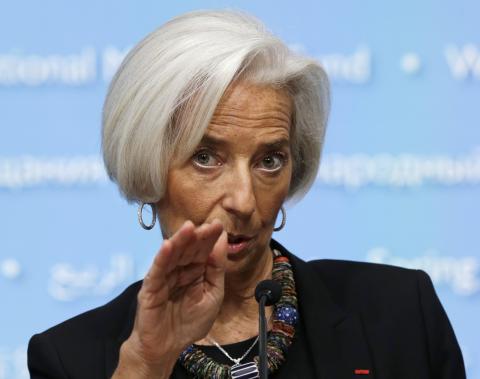Advertisement
IMF Approves $17 Billion Bailout For Ukraine Amid Big Risks
WASHINGTON (Reuters) - The International Monetary Fund's board signed off on a $17 billion two-year aid program for Ukraine on Wednesday to help the former Soviet republic's economy recover after months of upheaval as it continues to face geopolitical uncertainty.
The IMF aid will allow the immediate disbursement of $3.2 billion to Kiev and unlock further credits from other donors of about $15 billion, intended to help Ukraine stabilize its economy in the middle of its worst civil turmoil since independence in 1991.
IMF Managing Director Christine Lagarde admitted the program faced risks, including from the government's ability to carry out the politically unpopular measures necessary to get its finances in order.
"In particular, further escalation of tensions with Russia and unrest in the east of the country pose a substantial risk to the economic outlook," she said in a statement.
Pro-Moscow separatists seized government offices in more Ukrainian towns on Wednesday, a further sign authorities in Kiev are losing control of the country's eastern industrial heartland bordering Russia.
The unrest in the east follows months of anti-government protests and Russia's annexation of the Crimea region, which had already pushed Ukraine's economy to the brink of bankruptcy and a likely economic contraction this year.
Kiev is also in a dispute with Moscow over the price it will pay for natural gas exports in the future, and over about $2.2 billion Russia says it is owed for prior gas purchases.
Ukraine's economy may further suffer if sanctions intensify on Russia, a key export market. Western nations have placed visa bans and asset freezes on Russian individuals and companies over what they see as meddling in Ukraine.
"Anything that undermines the economic situation of (Ukraine) will jeopardize the implementation of the program, which is why we very strongly encourage the parties to negotiate, to come to terms," Lagarde told reporters after the board's decision.
The IMF on Wednesday slashed its already modest growth forecast for Russia, warning that sanctions were scaring off investors and pushing the economy towards recession.
SHRINKING ECONOMY
The IMF said it also expects Ukraine's economy to contract by about 5 percent this year; government forecasts are for a 3 percent contraction. The economy should rebound to 2 percent next year, and 4 to 4.5 percent after that, according to the fund.
External debt should rise to just below 100 percent of GDP this year as the government borrows money to finance itself and devalues its currency, even as revenues fall because of the economic contraction and political unrest.
The decision from the IMF's 24-member board, which includes representatives from Russia and the United States, allows Ukraine to meet looming obligations and avoid a potential debt default. Of the first tranche, $2 billion is intended to support the budget.
But political instability makes it even more difficult for Ukraine to get its economy back into shape, even though the new government has pledged to pursue reforms as a condition for receiving IMF aid.
The IMF's board decided to meet every two months for the next couple reviews of Ukraine's program, rather than follow the typical three-month schedule, in order to closely track the government's commitment to reforms such as floating the currency and cutting fiscal deficits.
Ukraine's previous two IMF programs were suspended after the government failed to do what it had promised.
The IMF expects Ukraine to implement major reforms in its energy and financial sectors, including raising the price of gas for domestic consumers.
The ultimate goal is to fully eliminate the deficit of Naftogaz, the state oil and gas company, by 2018.
Naftogaz imports a vast amount of gas and oil from Russia for distribution to home consumers, selling it for lower prices than what it paid and constantly running a deficit.
The Ukrainian government, in power until elections on May 25, has already said it would raise gas prices by more than 50 percent from this Thursday.
"(Ukraine) has demonstrated in the last few weeks that it can undertake comprehensive reforms and has actually addressed some of the issues that have been outstanding for a long time," Lagarde said. "We believe that Ukraine has an opportunity to seize the moment, to break away from previous practices, both from the fiscal, from the monetary, and from the governance point of view."
(Reporting by Anna Yukhananov; Editing by Meredith Mazzilli, Gunna Dickson and Prudence Crowther)



















Add new comment